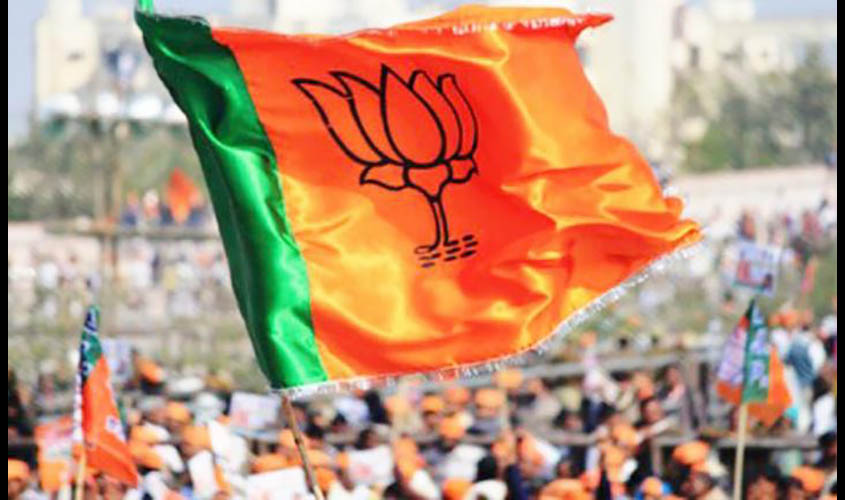Buoyed by the success of its candidate in the Jind Assembly byelection, the Bharatiya Janata Party is all set to further consolidate its position in Haryana. In all likelihood, Chief Minister Manohar Lal Khattar, after formal consultations with his Cabinet, may recommend the dissolution of the Assembly, so as to coincide fresh polls alongside the 2019 Lok Sabha elections. The objective is to cash in on the division of Jat votes, as well as to strengthen its own non-Jat base in the state where the Congress seems to be struggling to survive.
The Jind byelection has a special significance in the politics of Haryana since the outcome has sent out different messages to various contenders, who were in the fray. For the BJP, the convincing victory means that early polls may pave the way for yet another term. In 2014, the saffron brigade had won primarily on account of two factors—it had managed to divide the Jats, while simultaneously cornering the non-Jat votes which at one time were the vote bank of Bhajan Lal, former Chief Minister.
In addition, the Modi factor had come into play, and a strong anti-incumbency against the near decade Congress rule had set in. The BJP was able to wean away some disgruntled Congress leaders, such as Chaudhury Birendra Singh and Rao Inderjit Singh to assist in plotting the grand old party’s fall. Subsequently, the two leaders were accommodated in the Modi council of ministers. Khattar, who was hand-picked by the Prime Minister to be appointed as Chief Minister, is a man of immense integrity and has provided the requisite freedom to his colleagues for them to reach out to the people. The result being that the BJP has performed reasonably well in the polls and going by the recent success in the mayoral elections, things were proceeding in the right direction.
In Jind, the BJP fielded Krishan Midha, a Punjabi, who not only trounced his rivals, but pushed the Congress to the third position, where its nominee and chief spokesman, Randeep Surjewala, barely managed to save his deposit. It is, therefore indicative, that a sizable segment of Punjabis would vote for the BJP, besides a section of Dalits and other castes, making it a rather formidable opponent.
From the very onset, the Congress got its strategy wrong. Surjewala is an upcoming leader, considered close to Rahul Gandhi, and is a sitting member of the Assembly from Kaithal. By entering him in the battle, the high command grossly miscalculated; for more than four decades, no Jat has won from Jind, and Surjewala was considered as a proxy of the Congress president. Secondly, the party failed to recognise that defeating the BJP should have been its principal purpose, rather than sacrificing a leader whose future prospects have been undermined.
Surjewala also misread the scenario, believing that if he triumphed from Jind, he would displace all other leaders and emerge as the Chief Ministerial face. What he and his party did not reckon with was that the Congress had secured fewer votes than even the Jannayak Janata Party (JNN), which was founded barely two months ago by Ajay Chautala’s family in a power struggle in the INLD, currently controlled by Abhay Chautala.
The second and more imperative lesson for the Congress to pause over is that it has no organisational base in the state, something which became obvious in the humiliating defeat of Randeep Surjewala, who now may find it difficult to continue as the principal spokesman, given the wrong signals that would be sent out if he was present. With the Khattar government likely to dissolve the Assembly by the end of this month, the Congress high command has little option but to hand over the reins of the party to former Chief Minister, Bhupinder Singh Hooda. In Haryana, he wields considerable influence in all sections, and by the Jats he is considered to be the tallest leader from their community.
The problem that might arise by replacing Ashok Tanwar with Hooda is that some politicians could attempt to convince the high command that the Dalits, in large numbers, would gravitate towards the BJP. This issue can be amicably addressed by providing Tanwar with a prominent position in the campaign committee, while declaring him and Kumari Selja as the Congress Lok Sabha nominees from Sirsa and Ambala, respectively. To carry the battle into the BJP camp the party could consider fielding heavyweights like Deependra Hooda from Rohtak, Shruti Chaudhury from Bhiwani, Kuldeep Bishnoi from Hissar and Naveen Jindal from Kurukshetra. Their presence would facilitate in neutralising the BJP’s growing influence in Haryana, since all these individuals would contest on the strength of their own networking and personal coordination, rather than relying on the non-existent Congress organisation.
The Chautalas must realise that in order to succeed they would have to go onto a reconciliatory mode. In any case, if either of the parties, headed by the warring Chautalas, secures sufficient seats, they would consequently tie up with the BJP, thus helping it in the numbers game. The Sainis are displeased with the BJP, and therefore their nominee in Jind received a sizable number of votes. Every party would wish to woo this community.
It is crystal clear now that the BJP would be on the verge of another term in office. A late wake-up call for Congress, since in Haryana, it would not be easy to outwit the saffron outfit. Between us.

